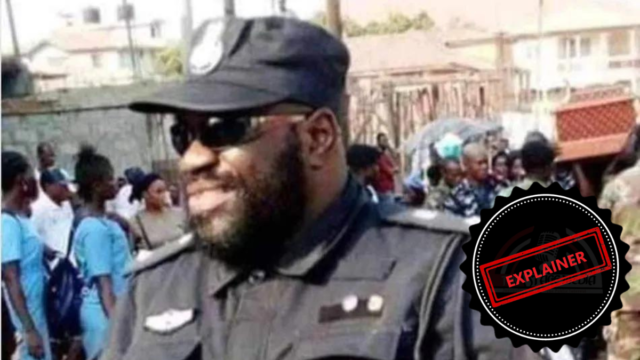
Claim: Extradition of the former Chief of Sierra Leone National Police from Liberia in violation of Human rights
The Liberian Government extradited Mr. Mohammed Yaelty Turay, a former Chief of Police, in accordance with the Republic of Sierra Leone’s request, rejecting calls from civil society organizations and the general public. Mohammed Yaelty Turay was reportedly extradited by the government through national security on August 9, 2023,
Extradition is the transportation of a person from a desired country to another jurisdiction for criminal investigation or punishment (sometimes referred to as a fugitive).
However, on August 8, 2023, the Liberian government declared that the transfer of the territory to Sierra Leone is in accordance with both the country’s laws and the 1986 non-aggression security treaty signed by the governments of Liberia, Sierra Leone, and Guinea.
The government’s actions had met serious condemnation from all spheres of society.
What we find:
Liberia is required by Article 2(3) of the 1969 OAU Convention, which governs the specific issues of the refugee crisis in Africa, not to reject a person who refuses to return to his place of origin out of well-founded fear. A person cannot be expelled from Liberia and sent back to a place where their life, physical integrity, or freedom would be in danger. Additionally, the 1957 UN Refugee Convention requires all signatory States to refrain from expelling a refugee in accordance with these Conventions.
The law on extradition:
The extradition treaties or agreements in effect for [country implementing the law] shall govern extradition pursuant to a treaty. Despite the aforementioned, unless otherwise specified in the relevant treaty or agreement in force, the extradition and transit proceedings procedures applicable to [country adopting the law], as set forth in sections 16–40 of the current law, shall apply to all requests for extradition.
Extradition may be handled by current law rules if there is no extradition treaty or agreement.
If such a decision has an impact on the terms of the Geneva Convention of August 12, 1949, its supplementary Protocols, and other international conventions that are multilateral.
And if the person whose extradition is requested has been or would be, subjected to torture or cruel, inhuman, or degrading treatment or punishment in the requesting state, or if that person has not received, or would not receive the minimum guarantees in criminal proceedings, as contained in Article 7 of the African Charter on Human and People’s Rights or other fundamental principles of human rights.
Section 8.3 of our Criminal Procedure Law and the Geneva Convention, to which Liberia has ratified membership, both apply. Since there is no such thing as extradition, the Republic of Liberia shouldn’t comply with the government of Sierra Leone’s request to hand over the former Chief Superintendent Mohammed Y. Turay. Mohammed Turay’s extradition would be justified by an agreement between the governments of Liberia and Sierra Leone.
The government of the People’s Republic of Sierra Leone declined to comply with the government of Liberia’s request to extradite Henry Costa in 2019 after he fled to seek asylum there in response to a protest on June 7, 2019, due to these various instruments and the absence of an extradition treaty between Sierra Leone and Liberia.
CSO weight in:
The extradition of the former head of the Sierra Leone National Police from Liberia on charges that he participated in a coup attempt in the neighboring country of Sierra Leone is regrettable and in violation of international, regional, and local human rights norms and practices, according to the Civil Society Human Rights Advocacy Platform of Liberia.
Superintendent Mohamed Toure, a former member of the Sierra Leone National Police, was deported to Sierra Leone on Tuesday, where he is wanted for suspected treason, the Liberian government announced.
Adama Dempster, Secretary General of the Civil Society Advocacy Human Rights Platform of Liberia, argued that the country should not have accelerated the extradition of the former head of the Sierra Leone Police on the grounds of his human rights and protection because Liberia is a state party to both international and regional human rights treaties.
Dempster contended that, in order to access the essence of the allegation free from any political intervention, he should have been provided with a fair process as an accused person. The Liberian Civil Society Advocacy Human Rights Platform asserted that before making a decision, the governments ought to have sought advice through diplomatic channels and involved Interpol.
“Mr. Toure should have had the chance to refute the accusations made against him in the extradition request from the government of Sierra Leone while in Liberia.”
According to Sierra Leonean law, every fugitive criminal in Sierra Leone shall be liable to be arrested and extradited in the manner authorized by the Act under the Act of Extradition Process in Sierra Leone.
“All requests for the extradition of a fugitive criminal shall be made through the customary diplomatic channels to the Attorney-General, who may issue and endorse on, or attach to, the original warrant or request an Order as prescribed in Form 1 in the Sixth Schedule if the Attorney-General is satisfied with the authenticity of the warrant in whose favour the request is made and that any other conditions on which, in the particular case, the extradition depends, appear to be satisfied.”
In the event that Mr. Tourre is subjected to torture and other inhumane treatment by the government of Sierra Leone, the CSO Platform demanded that the Liberian government accept responsibility and bear the blame for failing to defend his fundamental rights.
The civil society and the human rights community in Liberia maintained that they would follow up on Mr. Toure’s situation after consulting with their counterparts in the human rights community in Sierra Leone. They also denounced the wave of ongoing coups on the African continent.
”We further request that ECOWAS and the AU take the necessary steps to prevent coups and advance democratic governance in Africa.”
INCHR weighs in:
While the INCHR recognizes extradition as a critical tool for enforcing criminal laws across borders, it hastens to remind the government that extradition potentially threatens the rights of surrendered persons who could face physical abuse, unfair trial, or excessive punishment by the requesting foreign legal system. The core values that criminal-justice cooperation impinges on include individual freedoms, human rights, and legal fairness.
Recollecting that both the Republic of Sierra Leone and Liberia are signatories to several regional and international instruments, including the United Nations Convention Against Transnational Organized Crime and the ECOWAS Convention on Extradition, the INCHR reminds the Government of Liberia, among other things.
Legal Expert Stands:
Cllr. Tiawon Saye Gongloe, a former head of the Liberian National Bar, is also running for office. Cllr. Tiwan Gongloe asserts that it is “illegal” for the Liberian government to extradite the former police chief of Sierra Leone. Presidential candidate.
Conclusion: No record that Liberia has an extradition treaty with Sierra Leone.




